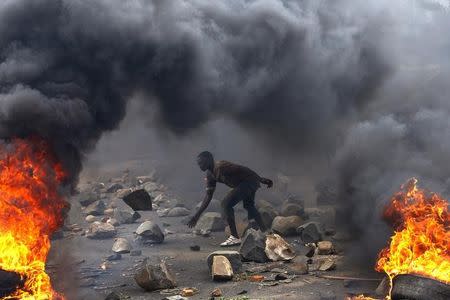African leaders trying to push Burundi to take peacekeepers: officials

By Aaron Maasho and Edmund Blair ADDIS ABABA (Reuters) - African states are trying to push President Pierre Nkurunziza to accept peacekeeping troops at a summit this week to prevent Burundi sliding back into ethnic conflict but there is little hope that he will agree, officials said. The African Union (AU) announced a plan in December to send 5,000 peacekeepers to Burundi, where more than 400 people have been killed in worst violence since an ethnically charged civil war ended in 2005. Burundi swiftly rejected the plan, with Nkurunziza saying any such force would be considered an "invasion". A senior AU diplomat said that African nations would try to persuade Nkurunziza to change his mind. "He is not expected to endorse the plan, however," the diplomat said. Sanctions could be considered if Nkurunziza did not accept, he told Reuters before the AU meeting in the Ethiopian capital of Addis Ababa, without giving any details. The AU initiative highlights growing international worries that allowing Burundi's crisis to fester could start fighting again in a region where memories of Rwanda's 1994 genocide are still raw. Burundi and Rwanda share the same ethnic mix of a majority Hutu population and a Tutsi minority. Diplomats from the U.N. Security Council visited Burundi last week, with some members seeking to push the president to accept. Samantha Powers, the U.S. ambassador to the United Nations, said little was achieved in those talks and urged African nations to work "behind the scenes" to convince him. If the AU sent in the force without Burundi's consent it would have to invoke Article 4 of the AU charter, which gives it the right to intervene in a member state "in respect of grave circumstances, namely: war crimes, genocide and crimes against humanity". Any deployment would follow final U.N. Security Council authorization. "The stakes are extremely high for the African Union," Stephanie Wolters of the Institute of Strategic Studies told a briefing this month, noting that sending a force against Burundi's wishes could be seen as a "precedent that will frighten a number of African governments". She said a phased deployment could make it more "palatable" for Burundi, with a small contingent initially protecting AU monitors sent last year to examine human rights and militia disarmament. They have yet to start work. Bernard Membe, Tanzania's foreign minister until November and who remains an official in the ruling party, told Reuters his country could help persuade Nkurunziza, given it was peace talks hosted by Tanzania that put him in office in 2005. "This is a crisis that should not be transformed into an ethnic crisis," he said. "It is better for the African countries, including Tanzania, to persuade the administration Burundi to comply and admit the AU intervention." (Writing by Edmund Blair; Editing by Louise Ireland)

